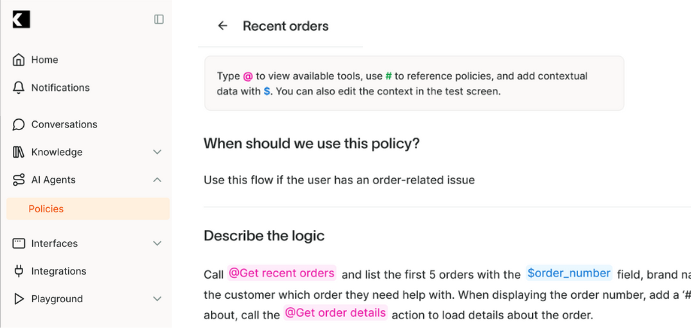Ingredients
BigCommerce, Gladly, and Kodif.
What are AI Policies?

At Kodif, we’re excited to announce the launch of Policies—a powerful, dynamic solution designed to revolutionize the way CX managers handle customer support. Unlike traditional flows, which are rigid and complex, Policies empower non-technical users to create and manage customer interactions with ease. Written in natural language, Policies make it simple to define and refine customer experiences without needing to rely on complicated flowcharts or scripting. This approach is not only user-friendly but also self-serve, enabling CX teams to quickly translate existing Standard Operating Procedures (SOPs) into automation, saving valuable time and resources.
The flexibility of Kodif Policies ensures that businesses can offer personalized, context-driven support while continuously improving customer experiences. With Policies, you can experiment with different strategies to optimize outcomes such as CSAT, revenue, and retention—all without the need to rebuild complex workflows. Whether it’s automating routine interactions or testing new approaches for high-stakes scenarios, Policies provide a scalable, adaptable solution that aligns with your business goals. While flows still have their place in sensitive, high-risk situations, Policies offer an agile alternative that helps businesses innovate faster and deliver exceptional, tailored experiences at scale.
“Update email address” ticket type explained
In customer support, the “Update email address” ticket type refers to the process of changing the email address associated with a customer’s account. This is a common request as customers may need to update their email for various reasons, such as switching email providers, security concerns, or correcting errors in the original email address. Efficient handling of these requests is crucial as the email address is often the primary contact method for account-related notifications, order confirmations, and promotional communications. Ensuring a seamless update process helps maintain customer satisfaction and trust.
Which Platforms does this AI policy work on?
This AI policy works seamlessly on BigCommerce, Gladly, and Kodif. Additionally, Kodif integrates with all other major platforms, ensuring versatility and broad applicability across different customer support systems.
When should I use this policy?
Use this policy when a customer requests to update the email address associated with their account.
Describe the logic
To execute this policy, follow these steps using available tools and natural language processing:
- Ask for the user’s current email address
-
Use @get_bigcommerce_account_details to verify if the provided email exists in BigCommerce.
-
Ask for the New Email Address
-
Request the customer to provide the new email address they wish to use.
-
Check for Duplicate Accounts
- Use @check_email_exists to check if the new email address is already linked to another account.
-
If it is, use the macro: “The email address you provided is already linked to another account. Please provide a different email address or contact support for further assistance.”
-
Update the Email Address in BigCommerce
- Use @update_customer_email(current_email: str, new_email: str) to update the customer’s email in BigCommerce.
- Inform the customer that their email has been successfully updated.
Policy logic
This policy should be applied when a customer requests to update the email address associated with their account.
Describe the logic
The logic follows these steps:
- Ask for the user’s current email address
-
Use @get_bigcommerce_account_details to ensure the email exists in BigCommerce.
-
Ask for the New Email Address
-
Prompt the customer to provide their new email address.
-
Check for Duplicate Accounts
- Use @check_email_exists to confirm if the new email is already tied to another account.
-
If so, apply the macro: “The email address you provided is already linked to another account. Please provide a different email address or contact support for further assistance.”
-
Update the Email Address in BigCommerce
- Execute @update_customer_email(current_email: str, new_email: str) to update the email in BigCommerce.
- Notify the customer of the successful update.
Example policy
Here’s how the policy operates:
- Ask for the user’s current email address
-
Use @get_bigcommerce_account_details to check if the provided email exists in BigCommerce.
-
Ask for the New Email Address
-
Request the new email address from the customer.
-
Check for Duplicate Accounts
- Use @check_email_exists to see if the new email is linked to another account.
-
If so, apply the macro: “The email address you provided is already linked to another account. Please provide a different email address or contact support for further assistance.”
-
Update the Email Address in BigCommerce
- Use @update_customer_email(current_email: str, new_email: str) to change the email in BigCommerce.
- Confirm the update with the customer.


